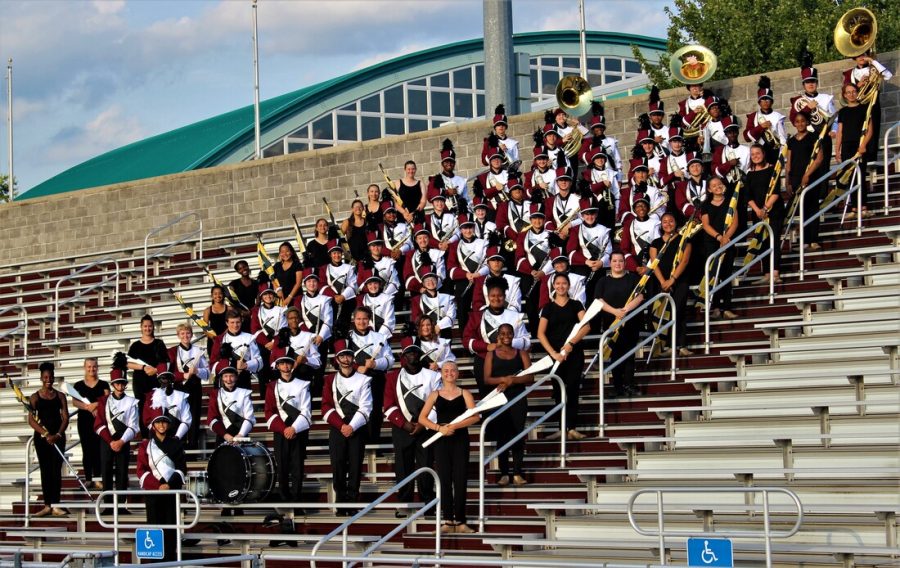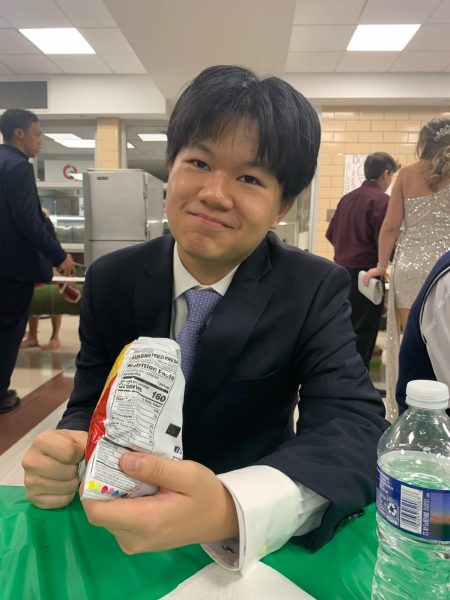Interview with Mr. Detato
March 21, 2022
Q: Why did you decide to become a teacher?
A: I was inspired by the teachers that I had back when I was a kid, especially my elementary and high school band director.
Q: Describe a time you felt that a student changed you or your perspective on things.
A: Over the course of my years here teaching at Abington, I’ve had a number of special needs students. Usually, their parents want to put them in Band for the experience. There was one student in particular. I watched this kid grow. He was in my class for five years, as you can stay until you’re 21 when you have special needs. I watched him change and grow and become more competent in what he was doing and in the way he learned and improved. At that time, they were all percussionists. This is so that I can get them started with something and have something to work with. By the time this kid was done, he wasn’t just playing the triangle, or hitting a cymbal. He was really a professional percussionist, playing the drums and even doing a little mallet work. I was just so very proud of him. It was just… amazing to watch that development and see music work for them. To see that music was helping this kid grow and have a positive impact on his life was something that forever changed my perspective on not only my job, but my duty as a band teacher— and that also answers your question on why I went into teaching; to have moments like this and to see the students that I work with grow as individuals.
Q: What attributes does someone need to have in order to be successful?
A: In my years as the band director, I’ve seen that those who are well-organized and have good time management skills usually succeed. These skills apply to everyone regardless of whether or not you are in Band. Success in a field like this oftentimes has nothing to do with how gifted you are with your instrument but instead the level of determination a student possesses. Students who aren’t naturally gifted, and honestly nobody is born gifted, but those who work hard and take the time to challenge themselves and build good working relationships can succeed in class.
Q: What are some of the biggest challenges you’ve faced because of the pandemic?
A: I can surely tell you that making music during a pandemic is challenging. Band and choir were hit the hardest. With wind instruments, you have to blow into something to make a sound. We have these masks with holes in them. Counter-intuitive, right? Bell covers have been a band-aid solution as well. From conferring with Mrs. Wolf, I know it’s difficult to sing with a mask on and get the same clarity.
Q: What are the biggest challenges that you’ve faced, non-pandemic related?
A: I never seem to have enough time to get the things we want to do done. In the music department, we always feel like we’re scrounging for space everywhere. Time. In some ways, the 85 mins periods may help cram more into a period.
Q: How long have you been teaching band/When did you come to Abington?
A: This is my 23rd year teaching band at Abington. Overall, this is my 35th year teaching.
Q: Has your role changed since you’ve been here?
A: When I first started, I just taught high school band. That’s symphonic band and concert band. Then, in the middle of the day, I taught 3 periods of elementary school lessons. I would also go around watching after kids in study halls. Occasionally I would give lessons, but other than personnel changes, meaning those who aren’t with us anymore at ASHS, things have relatively stayed the same. I also used to teach piano lessons for people.
I also teach a course called Interdisciplinary Studies. It’s a course for seniors, encompassing English, Social Studies, Art, and Music. We do these big units where we connect the dots between all these disciplines. Right now we’re going through a lot of things relating to Greece. In class so far, I know that we’ve studied things like Greek tragedy and Greek myths—Mr. Turner is in charge of that. We’ve also done Greek history, Greek art, and Greek Theater. Our final project is usually myths in the style of Greek music, with music being my specialty. In the end, we work to tie all of it together.
Q: What’s your favorite part about working in Band?
A: The kids. The rapport that we have with them.
Q: How do you engage reluctant learners?
A: It’s not easy. Most of the time, it’s because they are scared and outside of their comfort zone. Surprisingly, a lot of my Music Theory students are not musically involved. In other words, they don’t “Music”. They signed up for the class because they thought they were going to be making sick beats. Well, surprise, surprise! You’re now learning about the circle of fifths and intervals. If you’re a student reading this, beware! The most I can do after that is encouragement. I tell them, “We all have music inside of us.”
Q: What are your biggest strengths and weaknesses as a teacher?
A: Biggest strengths: organizations and structure, especially with the number of kids that I have. Weaknesses: I take on too much. I also have a problem saying no to students and parents. It’s hard!
Regarding parents, 99.9% of my interactions are very positive. There’s the occasional discipline issue with a student of mine, and we try to work together to help their kid. There are also the band boosters. I really appreciate them. Abington Band Boosters organization supports the jazz band and other needs. They provide a lot of fundraising and manpower because we need a lot of help moving stuff.
Q: Where do you see yourself in five years?
A: Simple. Two things. I’ll still be here or I’ll be retired.
A special thank you to Abington Director of Bands, Mr. Detato for the insight into his role in the Music Department. We send our best wishes and regards to the parents, students, and staff who continue to support the arts in ASD and come out to watch our school’s talented musicians perform!
In the words of Daniel Neymer, a Bass Clarinet, Mr. Detato is “the one that makes Band enjoyable and less of a classroom-like teacher-student experience.”


